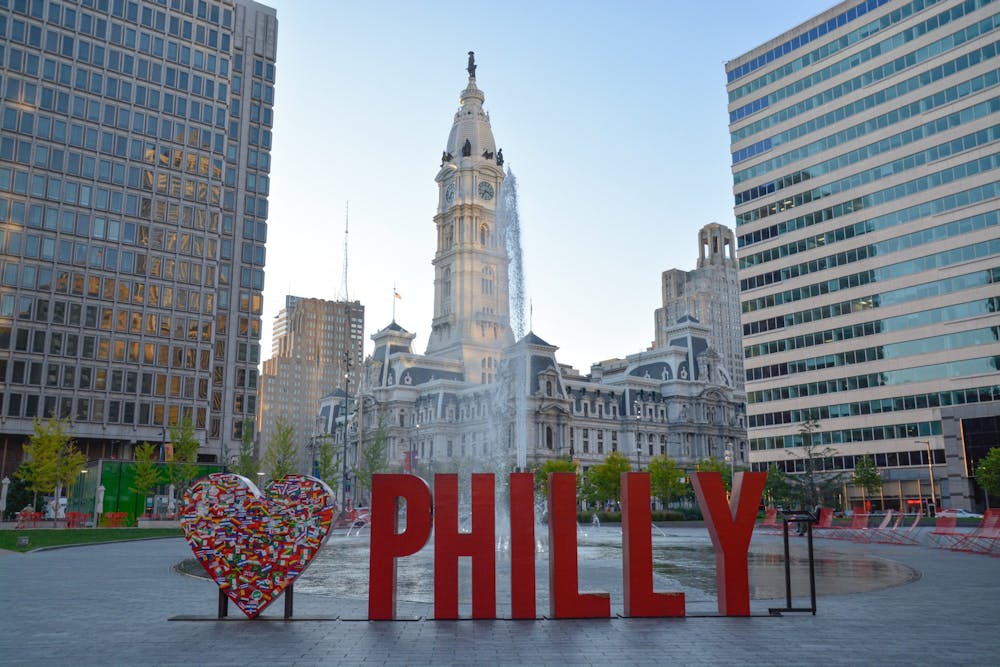If you were to receive a dollar every time a Penn student spoke poorly of Philadelphia, you would have enough money to plaster your name on a brand new campus building.
Philadelphia, like all cities, has its share of challenges. Behind Detroit, Philadelphia has the highest unemployment rate of any comparable city, and the highest violent crime and poverty rates. When BBC presenter Louis Theroux filmed a documentary on Philadelphia, he arrived clad in a bulletproof vest. In 2020, Philadelphia was also voted the dirtiest city in America.
Yet there is much to love about this place. For one, it possesses the perfect mix of polished and popular culture; the Barnes Foundation and the Philadelphia Museum of Art, blessed with the genius of Renoir and Cézanne, are perfect counterpoints to the colorful strings of street murals. The Philadelphia Orchestra lives in harmony with The Fillmore. Philadelphia is neither too uptight nor too brash; it is just right.
Philadelphia’s neighborhoods are hugely diverse. Trendy Manayunk bears no resemblance to the wild parks of Wissahickon or the calm, Georgian splendor of Society Hill. A walkable city with a quality transportation system, these areas are eminently explorable. For anyone that is interesting, Philadelphia is interesting. We are Philadelphian partisans, and we will defend it to the hilt.
What causes many Penn students to overlook the greatness? Perhaps it is snobbery. Philadelphia was once the heartland of the new American Republic. Immigration flowed up the Delaware, credit poured out of the National Bank, and Virginian statesmen deliberated in Independence Hall. Now, we are decidedly the city second-ranked in all metrics, pipped to the post by impatient New Yorkers, D.C. bureaucrats, and Bostonian intellectuals. The Ivy League competitive instinct, which tolerates only the very best, bleeds over into an unfairly negative assessment of the city.
Herein lies an irony. Those who glue themselves to Locust may seek to insulate themselves against the city. Yet the Philadelphian ethos quietly moves the desires of every Penn student.
Philadelphia was founded by Quakers fleeing religious intolerance. Unable to enter traditional careers like medicine or law, Quakers established themselves as successful, independent capitalists. This emphasis on business, so central to Philadelphia’s identity, manifested itself in the Wharton School. It is no coincidence that Joseph Wharton was from a Quaker family, and that Penn students are highly pre-professional. Quaker commercial quietism grounded Philadelphia as America’s first major industrial city. The spiritual home of the corporatized student is Philadelphia, not New York.
Quakers were also lukewarm on classical education; William Penn argued against reading altogether! Instead, they emphasized hard work and technical skill. Despite Penn’s mostly Anglican origins, this tradition has filtered in by way of the University’s unusually specialized undergraduate programs in nursing, engineering, and business.
SEE MORE FROM KEYVAN FARMANFARMAIAN:
We can even see the spirit of Quakerism in the Whartonite’s embrace of private success over the public realm. Historically, Philadelphia’s emphasis on spiritual and pecuniary self-betterment means it was termed “The Private City.” Today, Penn’s propensity to idolize the billionaire, not the politician, means we are overrepresented in industry, and underrepresented in public life. Philadelphia lays claims to almost no great American statesmen; after all, Benjamin Franklin was a Bostonian, a mere metic of Philadelphia. Indeed, to the extent that Philadelphia falls short as a city, it can often be pinned on an emphasis on the private.
An appreciation of our unique position as the county’s foremost practical school may help ease the University’s persistent Ivy League insecurity. The University simply does not follow in the highly intellectual, Puritan tradition of Yale or Harvard. Instead, the character of the student body is largely an outgrowth of the Philadelphian, Quaker trifecta: an introspective private spirit, an emphasis on practical skill, and a strong, commercial impetus.
Of course, the University’s relative lack of reputational luster might indicate a hole at the heart of the Quaker-Whartonite view of life. Ultimately, history remembers the leaders of society, those who face the public and forge a path through the complex conditions of modern life. In fact, many of Philadelphia’s great institutions were shaped in opposition to the Quaker compunction to squirrel away, amass and retreat. The Barnes Foundation, an industrialist’s collection of impressionist art, is one such institution. Albert Barnes’ pedagogical philanthropy appropriated the most laudable aspect of the Quakers, egalitarianism, while ignoring the reproaches of a recluse, unengaged Philadelphia elite. Perhaps we could learn something from his approach.
For better or for worse, uncoupling Penn from Philadelphia is a futile activity. To unfairly scorn Philadelphia is to also pour scorn on yourself as a Penn student. A certain partiality in favor of this great city we inhabit would not go amiss, yet a bit of introspection might reveal that Philadelphia’s problems don’t end but start on Locust Walk.
KEYVAN FARMANFARMAIAN is a College senior studying History from Central London, United Kingdom. His email is keyvanff@sas.upenn.edu.
NICHOLAS ROBSON is a College senior studying Economics and Philosophy from West London, United Kingdom. His email is nrobson@sas.upenn.edu.









